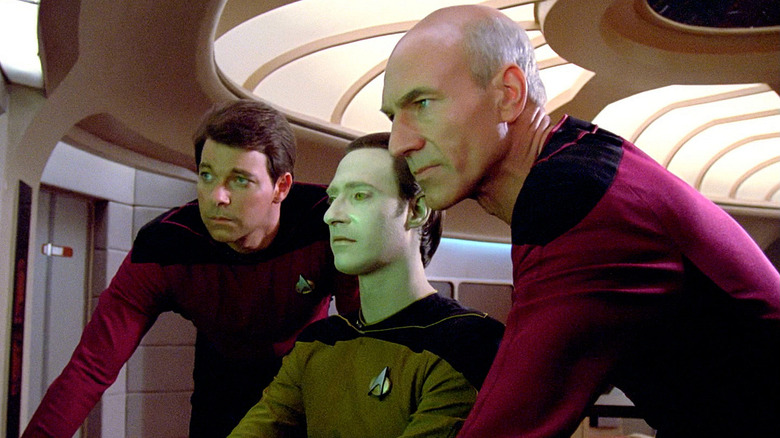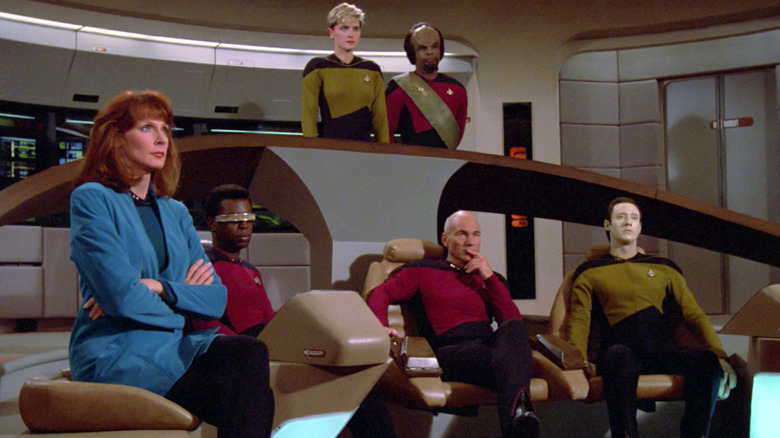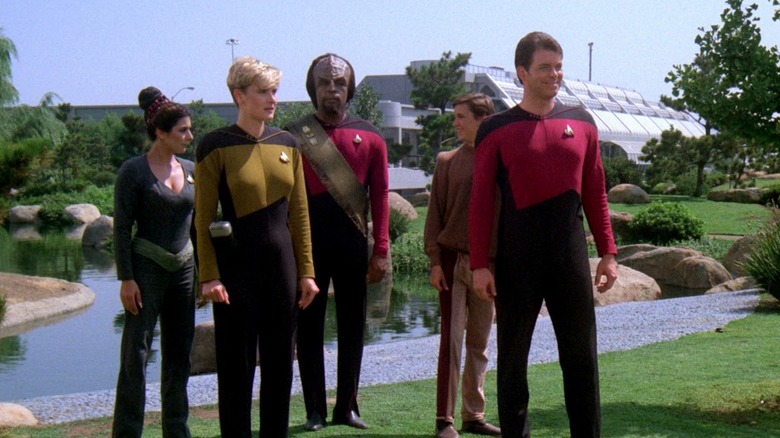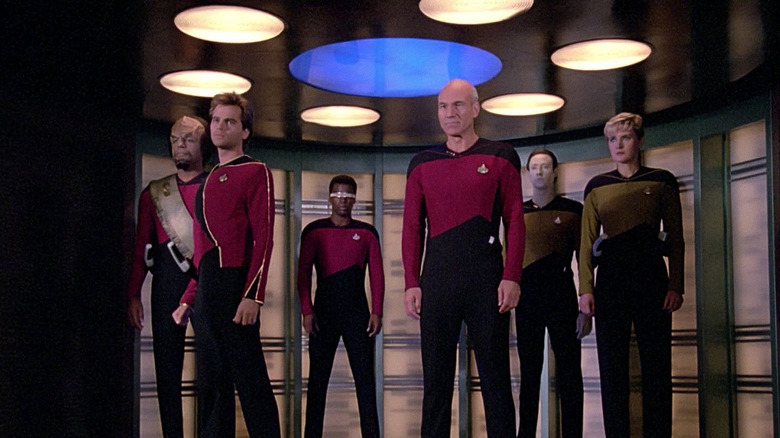The First Draft Of Star Trek: The Next Generation's 'Bible' Had A Major Character Problem
The original character sheet released during the audition period for "Star Trek: The Next Generation" — handily printed in Larry Nemecek's valuable sourcebook "The Star Trek the Next Generation Companion" — is a hoot for Trekkies. The sheet was penned by show creator Gene Roddenberry and producer David Gerrold in December of 1986, and it contained multiple striking character differences than what ended up on the show. For one, Captain Jean-Luc Picard was originally named Julian. Wesley Crusher was a teenage girl named Leslie. Data was to be played by an Asian actor. Also Lieutenant Tasha Yar was going to be a Latina security officer named Macha Hernandez.
At the same time that the character sheets were being authored, the "Next Generation" series bible was being written. According to the oral history book "The Fifty-Year Mission: The Next 25 Years: From The Next Generation to J. J. Abrams," Gerrold would come up with ideas for said bible, and Roddenberry would add ideas and codify everything into something that matched his vision. It's important to remember that Gene Roddenberry was eager to retain as much control as possible over "Star Trek: The Next Generation," as he had been recently been barred from working on the second, third, and fourth "Star Trek" movies. His peaceful vision of the future, then, was not to be tampered with. Part of Roddenberry's vision was a show that featured no interpersonal conflict. In the future, Roddenberry felt, everyone should get along, and problems should be solved by a group who always works well together.
This, unfortunately, led to a bible full of characters that were deeply isolated from one another. No one had bad relationships because no one had relationships at all. Longtime Trek writer D.C. Fontana went on record about this curious character deficiency.
No one has friends
Roddenberry and Gerrold were very good about constructing interesting "Star Trek" characters, but Roddenberry seemed to have seen them as being totally consumed by their duty to Starfleet. The characters may have been described as approachable or friendly, but Roddenberry made no reference to anyone's friends. How do these characters feel about each other? Are they merely co-workers? And why do they all retire back to empty quarters to live out their emotional struggles in solitude? Fontana felt there was a social aspect vitally missing from "Next Generation." She said:
"When I read the early draft of the bible, I felt a lack in the characters as proposed, primarily because I didn't see any references to friendships, relationships. Each character proposed seemed to have limited communication with the others, and each seemed to have a lot that will go on inside his/her head or in private."
Sure, their duties were clear, but Fontana noticed that "downtime" didn't seem to exist on the Enterprise-D. It was either all duty all the time, or it was sleep. There were no other modes. Fontana even noticed that the characters didn't address each other by their names. This was a wild difference from the original "Star Trek," which saw Dr. McCoy (DeForest Kelley) calling the captain "Jim" quite often. Fontana continued:
"The captain keeps his emotions private, goes to his cabin and communes with books. Con talks to the captain, but only to differ with him. She deals with her emotions in private. Ops talks to the ship. Number One has disagreements with the other senior officers and heads the contact teams. Who does he talk to, besides the 'few women who know him well enough to call him by his real name?'"
You can see the issue.
Sexy sex stuff
Another striking detail of the early character sheets and bibles for "Star Trek: The Next Generation" is how embarrassingly sexual they were. Roddenberry, a free-love advocate, clearly wrote in a lot of his own "types" into the character sheets, often leading to some sexist, borderline-icky descriptions. Dr. Crusher, for instance, was said to have "the natural walk of a striptease queen." Macha Hernandez was to have "a new quality of conditioned-body beauty." Stuff like that.
Fontana noticed the over-sexualization of the Data character and felt uncomfortable and frustrated. Was that the only interpersonal relationship that was allowed? Fontana said:
"The references to Data's relationship seem sexual only. Macha deals with her feelings privately and expresses her temper or displeasure aloud in dealing with stupidity or intolerance. Who does she talk to? Geordi is the only one who seems to have the capability of forming relationships."
(This statement is funny, given Geordi's now-well-known inability to hold down a romantic relationship).
Fontana posited that the lack of close friendships was a way for Roddenberry to avoid the "boy's club" vibe of the original series that walled Kirk, Spock, and McCoy off from the rest of the crew. It's a matter of record that William Shatner and Leonard Nimoy were notorious egomaniacs on the set of "Star Trek," thinking themselves the only important stars. Roddenberry seems to have wanted to put the kibosh on such attitudes right away. He destroyed the Boy's Club by destroying all the clubs.
Trust
Fontana felt it might be better to have a club with more people in it. Yes, the characters are professionals, but they also need to relate as people. That's the nature of any healthy workplace. It's important to get the work done, but it's also important that people get along and work well together. The captain, in order to be a good commander, had to know and trust his crew. Fontana wanted to insert that element back into "Next Generation."
"The backbone of Star Trek has always been relationships and human stories. Gene didn't want the buddy system that evolved before, but people do form friendships and trusts, loves and hates, in their working and personal lives. Both are contained side by side on this ship, and they must be seen in the characters. A base is there for the Captain and Con. If they don't have a relationship — one in which all elements know, trust, and depend on one another — that 'team' is not a team. It is in trouble."
It seems that eventually, cooler heads prevailed. Roddenberry took input and added some more interpersonal relationships. As the show went on, of course, a lot of those relationships expanded into interesting new places. Data and Geordi became good friends. Worf and Tasha Yar developed respect for one another. The captain wasn't as jovial as his first officer but trusted him to make sound decisions. The captain and Dr. Crusher also admitted to being attracted to each other but never pursued a relationship for professional reasons.
One might admire a Starfleet officer's intelligence and devotion to duty ... but it's okay that they have friends.



